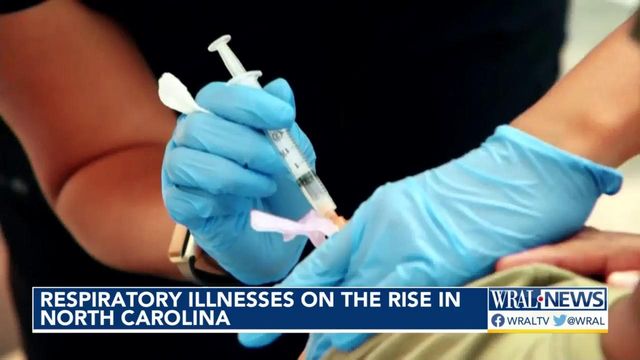Some respiratory illnesses on the rise in North Carolina
Respiratory syncytial virus (RSV) cases measured in participating North Carolina hospitals are up 31% since last week and 94% from the week before.
It’s part of an increasing trend that started toward the end of August. In fact, new state data released Wednesday shows cases of RSV are the highest North Carolina has seen since last December.
“It has always been a threat to infants in particular. But we also realize in our elderly individuals, it can look exactly like pneumonia,” said Dr. Nicholas Turner, a Duke assistant professor of infectious diseases.
Turner said there are new forms of protection available for vulnerable groups.
“We’ve always had Tamiflu to help with influenza and of course, there’s the seasonal flu vaccine that can help prevent that,” he said. “I was really excited when we finally got an RSV vaccine on the market that’s approved for our older individuals, especially with medical comorbidities and that there’s a new antibody that can protect infants from RSV disease.”
According to the U.S. Centers for Disease Control and Prevention, there are two RSV vaccines licensed for use in adults aged 60 years and older in the United States: RSVPreF3 (Arexvy, GSK) and RSVpreF (Abrysvo, Pfizer).
The CDC issued a health alert this week warning of a shortage of the aforementioned antibody drug meant to protect infants from RSV. The health agency advised doctors to only give the vaccine to infants at the highest risk of developing RSV.
In addition to RSV, flu cases are also up slightly compared to last week. Turner said trends have slightly changed for these types of illnesses.
“We’re all familiar with flu coming in the wintertime, RSV a little bit later in the winter,” Turner said. “It’s been a bit odd that since COVID, they’ve been just a touch off in their timing. For example, our flu season in North Carolina usually doesn’t really get going until often in the November, December range.
“A smidge early to already be seeing a bunch of cases. Similar with RSV, it’s often a little bit later in the winter, where we tend to hit our biggest peaks in numbers.”
On the other hand, COVID cases are down by 10% week over week. Hospitalizations and wastewater data are following that downward trend.
WRAL News asked Turner why cases of RSV and flu are growing, but COVID cases seem to be on the decline.
“RSV and flu both are classically very seasonal viruses. COVID hasn’t always obeyed those seasonal trends,” he noted.
Due to the COVID vaccine and natural antibodies, Turner says more people are protected from serious COVID-19 sickness.
In most cases, if you catch these respiratory illnesses, you will likely have mild symptoms. Safety measures like hand washing, keeping space between yourself and others and wearing masks are some of the best ways to lower your chances of getting sick.













